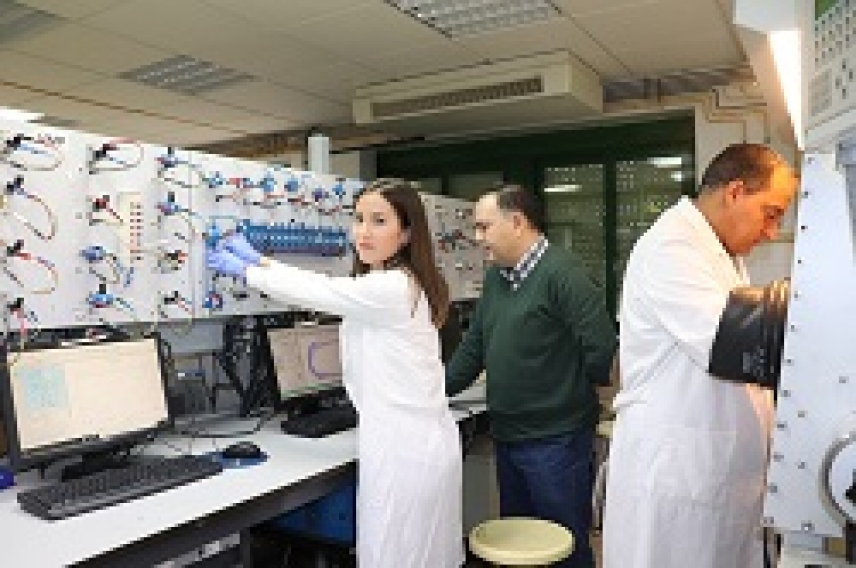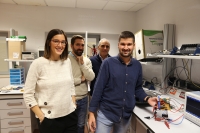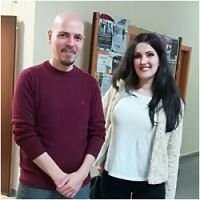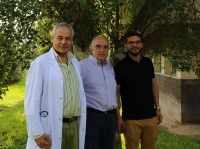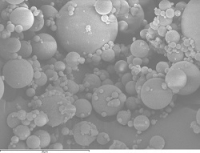Calcium passes the test to substitute lithium in rechargeable batteries for electric cars
Escrito por UCC+iResearch at the University of Cordoba shows the potential of calcium to be a component of batteries in the future at an theoretical and experimental level, due to it polluting less and its plentiful supply
One possible solution to pollution in cities from combustion engines is the use of electric vehicles. Currently lithium ion batteries are the most commonly used in electric vehicles. However, they are not free from problems. Foreseeably, lithium resources will be insufficient to cover the battery market in the future. In addition, lithium batteries are not as safe as can be and they contain toxic components that are environmentally damaging.
University of Cordoba researchers are able to improve prediction systems by reducing the quantity of information
Technology is taking giant leaps and bounds, and with it, the information with which society operates daily. Nevertheless, the volume of data needs to be organized, analyzed and crossed to predict certain patterns. This is one of the main functions of what is known as ‘Big Data’, the 21st century crystal ball capable of predicting the response to a specific medical treatment, the workings of a smart building and even the behavior of the Sun based on certain variables.
A University of Cordoba research group has developed a low cost sensor to custom measure the power quality of the structure in each device
More and more facilities are implementing management systems under the industry 4.0 paradigm based on smartness and efficient management. In particular, appliances come with an increasing amount of functions that make household chores easier: refrigerators that regulate their own temperatures or predict which foods need to go on the shopping list. But, what if, in addition to these features, appliances were able to measure the quality of the power they are supplied with? This would allow for self diagnoses, knowledge about what happened in the case of malfunction and the prevention of future malfunctions.
Phobic anxiety is linked to sexuality issues in women who are breast cancer survivors
Escrito por UCC+iA University of Cordoba research project reveals that mental well-being is a determining factor in sexual dysfunction in women affected by this kind of cancer
Psychological variables are determining factors in sexuality development. A study carried out by a research team made up of researchers from the University of Cordoba, the Maimonides Institute of Biomedical Research (in Spanish abbreviated to IMIBIC) and Queen Sofia University Hospital revealed that sexual dysfunction suffered by women who are breast cancer survivors is linked to phobic anxiety, which nevertheless, does not affect sexual function in women with no history of cancer.
Keeping phosphorus under control to improve the quality of life of those who suffer from renal failure
Escrito por UCC+iA University of Cordoba research team, Cordoba’s Maimonides Institute of Biomedical Research and Queen Sofia University Hospital link phosphorus normalization in blood to a decrease in a hormone that damages the heart
The FGF23 (Fibroblast growth factor 23) hormone originates in bone to communicate with the kidney whose duty it is to excrete excess phosphorus that the bone detects. Its main function is bone-kidney communication to eliminate phosphorus, but what happens when the person has renal failure and kidneys that do not work in addition to an impaired excretion ability? What happens is that the failing kidney is unable to abide by FGF23. Nevertheless, the bone keeps producing this hormone because it does not detect that the kidney has stopped working, resulting in a build-up of FGF23 in the blood.
Concrete made from coal ashes proves to be just as resistant as concrete from quarry aggregates
Escrito por UCC+iA University of Cordoba research team in partnership with the University of Navarra successfully uses waste from thermoelectric plants instead of natural resources to make concrete for structural use and demonstrates that it has the same characteristics for construction.
Overexploitation of quarries in order to obtain sand and gravel needed to produce concrete is currently one of the most challenging environmental issues. Rocks are not inexhaustible, though they may seem. So, for years the scientific community has been searching for a way to manufacture concrete without depleting the Earth’s crust. This is done by approaching the issue from different perspectives. This is the case of two University of Cordoba research teams that worked together in order to obtain a material that is just as sturdy and durable, but more sustainable. This was done by chemists and engineers working closely together.


